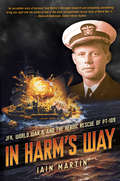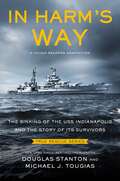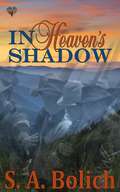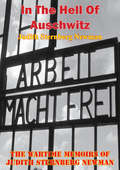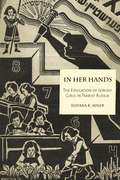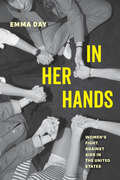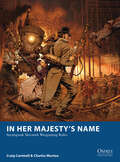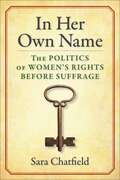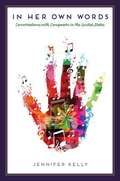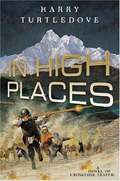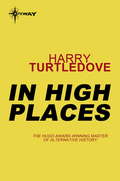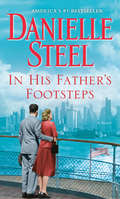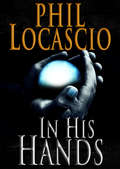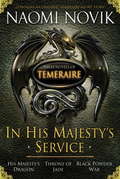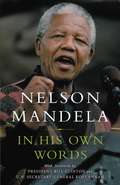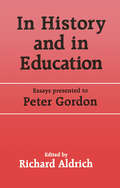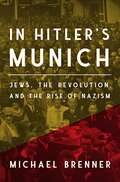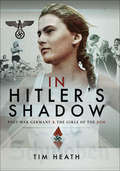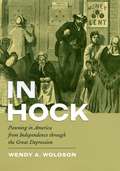- Table View
- List View
In Harm's Way: Jfk, World War Ii, And The Heroic Rescue Of Pt-109 (Scholastic Inc Reference Non-fiction Ser.)
by Iain MartinIn September 1941, young Jack Kennedy was appointed an Ensign in the U.S. Naval Reserve. After completing training and eager to serve, he volunteered for combat duty in the Pacific and was appointed commander of PT 109. On August 2, 1943, Kennedy's PT 109 and two others were on a night mission to ambush an enemy supply convoy when they were surprised by a massive Japanese destroyer. The unsuspecting Americans had only seconds to react as the Japanese captain turned his ship to ram directly into Kennedy's. PT 109 was cut in half by the collision, killing two of Kennedy's 12 crewmen and wounding several others in the explosion. In Harm's Way tells the gripping story of what happened next as JFK fought to save his surviving crew members who found themselves adrift in enemy waters. Photographs round out the exciting narrative in the first book to cover this adventurous tale for young readers.
In Harm's Way: The Sinking of the USS Indianapolis and the Extraordinary Story of Its Survivors
by Doug StantonOn the night of July 30, 1945, the Navy cruiser USS Indianapolis was torpedoed by a Japanese sub, sending 900 men into the Pacific. What happened next was a nightmarish battle for survival.
In Harm's Way: The Sinking of the USS Indianapolis and the Story of Its Survivors (True Rescue Series)
by Doug Stanton Michael J. TougiasA young readers edition of Doug Stanton and Michael J. Tougias' New York Times bestseller In Harm’s Way—a riveting World War II account of the greatest maritime disaster in US naval history."A masterful account of one of history's most poignant and tragic secrets." —#1 New York Times-bestelling author Lee ChildOn July 30, 1945, the U.S.S. Indianapolis was torpedoed in the South Pacific by a Japanese submarine. An estimated 300 men were killed upon impact; close to 900 sailors were cast into the Pacific Ocean, where they remained undetected by the navy for nearly four days and nights. Battered by a savage sea, they struggled to stay alive, fighting off sharks, hypothermia, and hallucinations. By the time rescue arrived, all but 316 men had died. The captain's subsequent court-martial left many questions unanswered: How did the navy fail to realize the Indianapolis was missing? And how did these 316 men manage to survive against all odds?This thrilling wartime account of heroism and survival, Book 5 in the True Rescue narrative nonfiction series, is inspiring and unforgettable—the perfect choice for young adventure-seekers.
In Heaven's Shadow
by S. A. BolichLilith Stark knows from experience that dead doesn't necessarily mean gone. Gettysburg took Joab's life, but her husband struck a bargain with Heaven to come home instead. She’s not about to turn away whatever the Yankees have left to her of their all-too-brief marriage. But when she inadvertently lets slip to the neighbors that not only has Joab come home, but one of the neighbor boys as well, she ignites a town already rubbed raw by the endless sorrows of civil war. Lilith, hoping to salvage the situation, only puts her foot in it deeper when she offers the good people of Browns Corners, Virginia, the benefits of her strange and perhaps saintly father's magic elixir. With the neighbors fighting over the elixir, the Reverend Fisk convinced she's the lying daughter of a shiftless devil, and the bereaved mother of the ghost living in Lilith's barn turning the whole town against her, Lilith's happy penchant for creating unexpected rainbows curdles to a despairing gathering of black creepers instead. A private little war between Lilith and the Reverend leads to a very public confrontation in which Lilith will either get the town to accept her--magic, ghosts, and all--or find herself locked away as a madwoman, deprived of everything that makes her life worthwhile.
In The Hell Of Auschwitz; The Wartime Memoirs Of Judith Sternberg Newman [Illustrated Edition]
by Judith Sternberg NewmanIncludes 204 photos, plans and maps illustrating The HolocaustDespite the Nazi oppression of all Jews in the lands under their control, Judith Sternberg Newman and her family were hugely fortunate to have managed get permission to settle in Paraguay in 1940. However their escape was blocked by the German authorities who refused to provide an exit visa, from that moment on, as the author notes, "fate turned against us". As the author relates in these horrific memoirs are the torments, brutality and death at Auschwitz; the treatment that left here by the end of the war as the only surviving member of her family. She emigrated to America in 1947 where she was able to practise at her chosen profession in nursing and raise a family.
In Her Bed
by Deborah MacgillivrayDREAM LOVER Damian St. Giles has woken up before with a sore head from imbibing too much mead, but finding himself naked and shackled to a bed is an entirely new experience. As if in a dream, a flame-haired enchantress appears and offers him a brew to ease his pain. . . and enflame his desire. He soon realizes this Highland beauty has given him a potent aphrodisiac and she is fully prepared to take all his body has to offer. . . TRUE DESIRE Lady Aithinne Ogilvie knows she must treat this man as nothing more than a stud, for that is what he is to her. . . a means to get her with child and thus produce an heir who will save her inheritance from ruthless Scottish warriors and greedy King Edward. Yet she cannot deny the instant bond she feels for this handsome stranger—and the feeling that it will be the prisoner in her bed who will end up laying claim to her heart.
In Her Hands: The Education of Jewish Girls in Tsarist Russia
by Eliyana R. AdlerThough over one hundred private schools for Jewish girls thrived in the areas of Jewish settlement in the Russian empire between 1831 and 1881, their story has been largely overlooked in the scholarship of Jewish educational history. In Her Hands: The Education of Girls in Tsarist Russia restores these schools to their rightful place of prominence in training thousands of Jewish girls in secular and Judaic subjects and also paving the way for the modern schools that followed them. Through extensive archival research, author Eliyana R. Adler examines the schools' curriculum, teachers, financing, students, and educational innovation and demonstrates how each of these aspects evolved over time. The first section of this volume follows the emergence and development of the new private schools for Jewish girls in the mid-1800s, beginning with the historical circumstances that enabled their creation, and detailing the staffing, financing, and academics in the schools. Adler dispels the myth that all education in Russia was reserved for boys by showing that a dedicated group of educators and administrators worked to provide new opportunities for a diverse group of Jewish girls. In the second section, Adler looks at the interactions between these new educational institutions and their communities, including how the schools responded to changes taking place around them and how they in turn influenced their environment. Adler consults several major archives, including those of the former Russian Ministry of Education, along with contemporary periodicals, educational materials, and personal memoirs to provide a remarkably complete picture of education for Jewish girls in Russia in the mid- to late nineteenth century. In telling the story of Russia's private schools for Jewish girls, Adler argues that these schools were crucibles of educational experimentation that merit serious examination. Scholars of Jewish history, educational history, and womens' studies will enjoy this pathbreaking study.
In Her Hands: Women's Fight against AIDS in the United States
by Dr. Emma DayIn Her Hands examines the various strategies women have utilized to fight for recognition as individuals vulnerable to and living with HIV/AIDS across multiple settings since the 1980s. Taking a new chronological and thematic approach to the study of the US epidemic, it explores five arenas of women’s AIDS activism: transmission and recognition, reproductive justice, safer sex campaigns for queer women, the carceral state, and HIV prevention and treatment. In so doing, it moves the historical understanding of women’s experiences of AIDS beyond their exclusion from the initial medical response and the role women played as the supporters of gay men. Asking how and on what terms women succeeded in securing state support, In Her Hands argues that women protesting the neglect of their health-care needs always risked encountering punitive intervention on behalf of the symbolic needs of fetuses and children – as well as wider society – deemed to need protecting from them.
In Her Highlander's Bed: A Novel (Highland Brides #11)
by Lynsay SandsFor fans of Outlander, New York Times bestselling author Lynsay Sands’ newest installment of the Highland Brides series brings us a sweeping tale of passion as a laird’s swim in a loch leads to the love of a lifetime.An invigorating swim in the loch was exactly what Calan Campbell, Laird of Kilcairn, needed after defeating his enemies in battle. What he didn’t need was a thief running away with his plaid while he swam. Calan gave chase and managed to catch the lad, only the lad turned out to be a lass, and obviously a lady. Having hit her head when he’d tackled her to the ground, the woman was now unconscious and couldn’t explain how she had ended up bruised and naked in his woods. He’d have to take her back to his castle and tend her wounds to learn that.Kidnapped and forced to wed her clan’s enemy, Allissaid MacFarlane had risked death to escape. But after a struggle over a plaid she tried to “borrow,” she awakens in a strange bed with a strange man seated in a chair beside her. Unsure if he is friend or foe, she claims not to remember her own name or how she’d come to be in the clearing. However, the more time she spends with Calan, the more she falls for this strong, honorable laird. She soon decides she can trust him with her life. . . but can she trust him with her heart?
In Her Majesty's Name
by Fabien Lascombe Craig CartmellIt is 1895 and the world is in turmoil. In the decades to come, historians will reflect upon the cause of this state of affairs and many will point squarely at Charles Babbage. The perfection of first his Difference Engine, and then his Analytical Engine, gave the new scientific establishment in the Great Powers the tool they had so long needed in order to make a dramatic leap forward. The ability to make huge and repeatable sets of complex calculations revolutionized the world.Within twenty years came the 'invention' of Cavorite, the perfection of miniaturized steam engines, electric light and motors, Radium Bricks, Arc weapons, Hydrogen and Helium Dirigibles, Road Trains, Calculating Artillery Engines, Sea and Land Dreadnoughts - the list is almost endless. Nothing is impossible when the wealth of a Great Power is coupled to the unlimited imagination of educated men of science and their engineers.The one thing that all these marvellous advances have not brought is peace. Every Great Power has been jostling its neighbours for resources and more importantly, the latest technology. None can afford to stand still and allow its neighbours to advance their science and engineering unmolested. If they do, they risk being overwhelmed as the French were in 1861 by the Prussians' mobile Calculating Artillery Engines, or as the Union was the year after that, with their ports put to the flame and successfully blockaded by the Confederacy's Armoured Sea Dreadnoughts.Some nations have also been tapping into older, more sinister powers, in order to produce an unholy combination of the mystical and the mechanical, such as the Prussian Todt-truppen.Although there have been relatively few open conflicts between the Great Powers, a state of undeclared and secret war exists between them all. This is where the Adventuring Companies come in. These are the deniable clandestine agents of the Great Powers (and of other globe-spanning organizations). They act in the shadows pitting their skills, their wits and the latest technologies against each other, to obtain the latest scientific formula, artefact or other vital component.Small groups of highly skilled and specialized operatives are brought together for each mission under the command of a trusted 'Captain'. In Great Britain they work out of the Explorers' Club in London. In Prussia their patron is the highly secretive Thule Society. In the USA they are mostly sponsored by the Secret Service. There are similar organizations in each of the Great Powers. They each have the choice of their nation's latest arms, armour and other equipment with which to perform their missions.
In Her Own Name: The Politics of Women’s Rights Before Suffrage
by Sara ChatfieldLong before American women had the right to vote, states dramatically transformed their status as economic citizens. In the early nineteenth century, a married woman had hardly any legal existence apart from her husband. By the twentieth, state-level statutes, constitutional provisions, and court rulings had granted married women a host of protections relating to ownership and control of property. Why did powerful men extend these rights during a period when women had so little political sway?In Her Own Name explores the origins and consequences of laws guaranteeing married women’s property rights, focusing on the people and institutions that shaped them. Sara Chatfield demonstrates that the motives of male elites included personal interests, benefits to the larger economy, and bolstering state power. She shows that married women’s property rights could serve varied political goals across regions and eras, from temperance to debt relief to settlement of the West. State legislatures, constitutional conventions, and courts expanded these rights incrementally, and laws spread across the country without national-level coordination.Chatfield emphasizes that the reform of married women’s economic rights rested on exclusionary foundations, including protecting slavery and encouraging settler colonialism. Although some women benefited from property reforms, many others saw their rights stripped away by the same processes. Drawing on a mix of qualitative and quantitative evidence, In Her Own Name sheds new light on the place of women in the fitful democratization of the United States.
In Her Own Words: Conversations with Composers in the United States
by Jennifer KellyThis collection of new interviews with twenty-five accomplished female composers substantially advances our knowledge of the work, experiences, compositional approaches, and musical intentions of a diverse group of creative individuals. With personal anecdotes and sometimes surprising intimacy and humor, these wide-ranging conversations represent the diversity of women composing music in the United States from the mid-twentieth century into the twenty-first. The composers work in a variety of genres including classical, jazz, multimedia, or collaborative forms for the stage, film, and video games. Their interviews illuminate questions about the status of women composers in America, the role of women in musical performance and education, the creative process and inspiration, the experiences and qualities that contemporary composers bring to their craft, and balancing creative and personal lives. Candidly sharing their experiences, advice, and views, these vibrant, thoughtful, and creative women open new perspectives on the prospects and possibilities of making music in a changing world.
In Her Words: Women's Writings in the History of Christian Thought
by Amy G. OdenThis book illustrates the contributions made to contemporary Christian theology by the increasing number of female theologians. Oden compiles selections from the writings of major female theologians from the early church through the present.
In High Places (Crosstime Traffic, book #3)
by Harry TurtledoveIn the twenty-first- century kingdom of Versailles, roads are terrible and Paris is a dirty little town. Serfdom and slavery are both common, and no one thinks that's wrong. Why should they? Most people spend their lives doing backbreaking farmwork anyway. But teenaged Khadija, daughter of a prosperous family of Moorish business travelers, is unfazed. That's because Khadija is really Annette Klein from twenty-first-century California, and her whole family are secret agents of Crosstime Traffic, trading for commodities to send back to our own timeline. Now it's time for Annette and her family to go home for the start of another school year, so they join a pack train bound for their home base in Marseilles, where the crosstime portal is hidden. Then bandits attack while they're crossing the Pyrenees. Annette/Khadija is separated from her parents and knocked out, and wakes up to find herself a captive in a caravan of slaves being taken to the markets in the south. She's in a tight spot. Then the really scary thing happens: her captors take her, along with other newly purchased slaves, to an unofficial crosstime portal... leaving open the question of whether Crosstime Traffic will ever be able to recover her!
In High Places
by Harry TurtledoveIn the twenty-first-century Kingdom of Versailles, the roads are terrible and Paris is a dirty little town. Serfdom and slavery are both common, and no one thinks that's wrong. Why should they? Most people spend their lives doing backbreaking farm work anyway.But teenaged Khadija, daughter of a prosperous family of Moorish business travellers, is unfazed. That's because Khadija is really Annette Klein from twenty-first-century California. Now it's time for Annette and her family to return to California for the start of another school year, so they begin a journey to the hidden crosstime portal in Marseilles. As they cross the Pyrenees, bandits attack. When Annette/Khadija comes to, she's a captive in a caravan of slaves being taken to the markets in the south. Worse, her purchasers take her to an unofficial crosstime portal, a thing hitherto unknown . . . leaving open the question of whether Crosstime Traffic will ever be able to recover her!
In His Father's Footsteps: A Novel
by Danielle SteelIn this powerful novel, #1 New York Times bestselling author Danielle Steel tells the story of two World War II concentration camp survivors, the life they build together, and the son who faces struggles of his own as a first generation American determined to be his own person and achieve success. <P><P>When U.S. troops occupy Germany, friends Jakob and Emmanuelle are saved from the terrible fate of so many in the camps. With the help of sponsors, they make their way to New York. In order not to be separated, they allow their friendship to blossom into love and marriage, and start a new life on the Lower East Side, working at grueling, poorly paid jobs. Decades later, through talent, faith, fortune, and relentless hard work, Jakob has achieved success in the diamond business, invested in real estate in New York, and shown his son, Max, that America is truly the land of opportunity. Max is a rising star, a graduate of Harvard with friends among the wealthiest, most ambitious families in the world. And while his parents were thrown together by chance, Max chooses a perfect bride to start the perfect American family. An opulent society wedding. A honeymoon in Tahiti. A palatial home in Greenwich. Max’s lavish lifestyle is unimaginable to his cautious old-world father and mother. Max wants to follow his father’s example and make his own fortune. <P><P>But after the birth of children, and with a failing marriage, he can no longer deny that his wife is not the woman he thought she was. Angry and afraid, Max must do what he has never done before: struggle, persevere, and learn what it means to truly walk in his father’s footsteps, while pursuing his own ideals and setting an example for his children. <P><P>Moving from the ashes of postwar Europe to the Lower East Side of New York to wealth, success, and unlimited luxury, In His Father’s Footsteps is a stirring tale of three generations of strong, courageous, and loving people who pay their dues to achieve their goals. <P><b>A New York Times Bestseller</b>
In His Hands
by Phil Locascio“A fantastical, thought-provoking page turner” (Robert Foster, bestselling author of The Lunar Code). In 1928, when Demetri Davos discovers a mysterious crystal ball that can grant him anything he asks, he soon learns that power always comes with a price. After two selfish requests result in the death of innocent people, he resolves never to use the orb again. But when the Nazis begin their march across France, the desperate half-Jewish Demetri is forced into a life-or-death decision—and has to break his vow to make his escape. Years later in Chicago, he is rich and happily married—but a vengeful nemesis, who knows of the ball’s power, now wants what he’s owed—and will stop at nothing to get it. With his family in peril, Demetri is forced to pay for his past, and for wishes granted, time after time . . . after time . . . Spanning from Europe to America and across decades, In His Hands traces one good man’s struggle to combat his own inadequacies and resist overwhelming temptation in a deadly moral tug-of-war.
In His Majesty's Service: Three Novels of Temeraire (His Majesty's Service, Throne of Jade, and Black Powder War) (Temeraire)
by Naomi NovikTogether in one volume, here are the first three novels in Naomi Novik's New York Times bestselling Temeraire series, combining the gripping history of the Napoleonic era, the thrill of Anne McCaffrey's Dragonriders of Pern books, and the excitement of Patrick O'Brian's seafaring adventures. In His Majesty's Service also includes an exclusive original Temeraire short story.Capt. Will Laurence is serving with honor in the British Navy when his ship captures a French frigate harboring most a unusual cargo-an incalculably valuable dragon egg. When the egg hatches, Laurence unexpectedly becomes the master of the young dragon Temeraire and finds himself on an extraordinary journey that will shatter his orderly, respectable life and alter the course of his nation's history. Thrust into England's Aerial Corps, Laurence and Temeraire undergo rigorous training while staving off French forces intent on breaching British soil. But the pair has more than France to contend with when China learns that an imperial dragon intended for Napoleon-Temeraire himself- has fallen into British hands. The emperor summons the new pilot and his dragon to the Far East, a long voyage fraught with peril and intrigue. From England's shores to China's palaces, from the Silk Road's outer limits to the embattled borders of Prussia and Poland, Laurence and Temeraire must defend their partnership and their country from powerful adversaries around the globe. But can they succeed against the massed forces of Bonaparte's implacable army?From the Hardcover edition.
In His Own Words: From Freedom To The Future
by Bill Clinton Nelson Mandela Kofi Annan"There is no easy way to walk to freedom anywhere, and many of us will have to pass through the valley of the shadow of death again and again before we reach the mountain tops of our desires." -Nelson Mandela, September 1953In spreading the message of freedom, equality, and human dignity, Nelson Mandela helped transform not only his own nation, but the entire world. Now his most important speeches are collected in a single volume. From the eve of his imprisonment to his release twenty-seven years later, from his acceptance of the Nobel Peace Prize to his election as South Africa's first black president, these speeches span some of the most pivotal moments of Mandela's life and his country's history.Arranged thematically and accompanied by tributes from leading world figures, Mandela's addresses memorably illustrate his lasting commitment to freedom and reconciliation, democracy and development, culture and diversity, and international peace and well-being. The extraordinary power of this volume is in the moving words and intimate tone of Mandela himself, one of the most courageous and articulate men of our time.
In History and in Education: Essays presented to Peter Gordon (Woburn Education Series #11)
by Richard AldrichThis tribute from historian and educationists to the work and influence of Peter Gordon, Emeritus Professor at the Institute of Education in London, is grouped round the central theme of the educational history of the 19th and 20th centuries.
In History's Shadow: An American Odyssey
by John Connally Mickey HerskowitzIn June 1993, John Connally, a legend in Texas and a powerful figure in national politics for several crucial decades of this turbulent century, died of complications of pulmonary fibrosis, a condition brought on by wounds sustained from an assassin's bullet that fateful day in Dallas--November 22, 1963. This first-person book, finished right before Connally's death, is the story of his life in politics, told with an unmistakable Texas twang. It was a life of almost Shakespearean range, marked by great triumphs as well as personal tragedy and heartbreak. He wanted to be president, but that is the only ambition that eluded him. He lived under thirteen presidents and served under Kennedy, Johnson, and Nixon. He knew American government--and the men who ran it--as intimately as anyone in our time. His story is a true epic of the American century.
In Hitler's Munich: Jews, the Revolution, and the Rise of Nazism
by Michael BrennerFrom acclaimed historian Michael Brenner, a mesmerizing portrait of Munich in the early years of Hitler's quest for powerIn the aftermath of Germany's defeat in World War I and the failed November Revolution of 1918–19, the conservative government of Bavaria identified Jews with left-wing radicalism. Munich became a hotbed of right-wing extremism, with synagogues under attack and Jews physically assaulted in the streets. It was here that Adolf Hitler established the Nazi movement and developed his antisemitic ideas. Michael Brenner provides a gripping account of how Bavaria's capital city became the testing ground for Nazism and the Final Solution.In an electrifying narrative that takes readers from Hitler's return to Munich following the armistice to his calamitous Beer Hall Putsch in 1923, Brenner demonstrates why the city's transformation is crucial for understanding the Nazi era and the tragedy of the Holocaust. Brenner describes how Hitler and his followers terrorized Munich's Jews and were aided by politicians, judges, police, and ordinary residents. He shows how the city's Jews responded to the antisemitic backlash in many different ways—by declaring their loyalty to the state, by avoiding public life, or by abandoning the city altogether.Drawing on a wealth of previously unknown documents, In Hitler's Munich reveals the untold story of how a once-cosmopolitan city became, in the words of Thomas Mann, "the city of Hitler."
In Hitler's Shadow: Post-War Germany & the Girls of the BDM
by Tim HeathFrom the author of Hitler&’s Girls comes the revealing true story of the aftermath of WWII—told by the Third Reich&’s fallen &“Angels of Death&” themselves. In the wake of Germany&’s unconditional surrender in May 1945 and Japan&’s subsequent surrender later that July, the Allied press proclaimed across the world &“Victory! War is Over!&” The truth for many Germans, particularly the teenage girls of the former Bund Deutscher Mädel, was that a new war was just beginning. They were members of the League of German Girls—ten to eighteen-years old—who had been indoctrinated and trained as armed &“she-devils&” of the Third Reich. Drawing on eyewitness accounts, diary entries, and rare interviews with nearly forty members of the BDM, historian Tim Heath reveals the post-war hopes, horrors, and confusion through the eyes of the female wing of Hitler Youth. He recounts their struggle to rebuild their lives destroyed by years of war, and how a country, and these young women, came to terms with the terrible war crimes they were party to. Through these &“interesting and sometimes horrifying accounts of how these women fared in the dying days of the Reich and in post-war Germany,&” In Hitler&’s Shadow sheds light on on one of the darkest times of the twentieth century (Historical Novel Society).
In Hitler's Shadow: An Israeli's Amazing Journey Inside Germany's Neo-Nazi Movement
by Yaron Svoray Nick TaylorSvoray to be a sympathetic American and not realizing he was Jewish, introduced him to the semisecret world of German neo-Nazism. In a short time, Svoray contacted the Simon Wiesenthal Center in Los Angeles and, with the center's backing, returned to Germany under the name of "Ron Furey," the American representative of a fictitious right-wing organization. So began a remarkable and shocking series of encounters between Svoray and members of Germany's neo-Nazi underground. Putting himself at great personal risk and constantly fearing that his identity would be discovered, Svoray met-and documented with hidden cameras and recording devices-a terrifying array of believers both young and old whose reach, he was shocked to find out, extends throughout Germany and beyond. He came across brutal young skinheads; paramilitary training camps that have sent neo-Nazi fighters to support Croatian soldiers in the former Yugoslavia; a network of committed neo-Nazis who are using their money and connections to establish political organizations; and politicians of the far right who cloak their connections to the movement in nationalist rhetoric. In Hitler's Shadow is a sobering report on the real threat that is posed by Germany's neo-Nazi movement, and a startling portrayal of the dangerous personalities behind it, told by a man of immense courage who has penetrated its heart of darkness. YARON SVORAY has been a paratrooper in the Israeli Defense Force and a detective in Israel's Central Police Command, and is currently an investigative journalist. He lives in Israel. NICK TAYLOR is the author of four previous works of nonfiction: Bass Wars, Sins of the Father, Ordinary Miraclesand A Necessary End. He lives in New York.
In Hock: Pawning in America from Independence through the Great Depression
by Wendy A. WolosonThe class of working poor begotten by this economic tide could make ends meet, Wendy Woloson argues, only by regularly visiting pawnshops to supplement their inadequate wages. Nonetheless, businessmen, reformers, and cultural critics berated the shops for promoting vice and used anti-Semitic stereotypes to cast their proprietors as greedy and cold-hearted. Parsing and subverting these caricatures, Woloson shows that pawnbrokers were in fact shrewd businessmen, often from humble origins, who honed sophisticated knowledge of a wide range of goods and their values in different markets. In the process, she paints a resonant portrait of the generations of Americans whose struggle for economic survival often depended on an institution that has remained, until now, woefully misunderstood.
